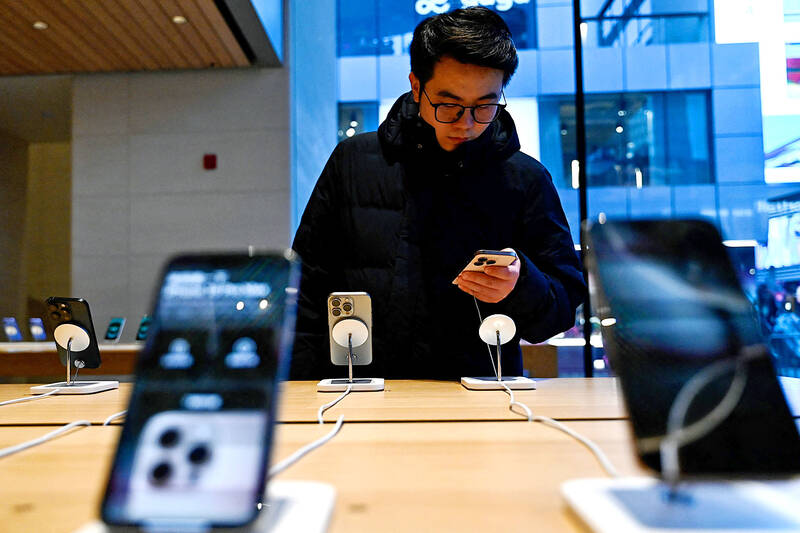Alibaba Group Holding (阿里巴巴) chairman Joe Tsai (蔡崇信) yesterday said that the company would partner with Apple Inc on artificial intelligence (AI) for iPhones sold in China, sending the Hong Kong-listed shares of the Chinese tech giant soaring over 9 percent to a three-year high.
“They talked to a number of companies in China. In the end they chose to do business with us. They want to use our AI to power their phones. We feel extremely honored to do business with a great company like Apple,” Tsai said at the World Governments Summit in Dubai.
The Hong Kong-listed shares of Alibaba jumped as much as 9.2 percent to HK$124.3, their highest since January 2022.

Photo: AFP
Apple has yet to provide its full suite of AI features in China because of regulations that require it to partner with a locally accredited company, Tsai said.
He said he expects that would be the case for the long term, but did not specify if Alibaba is or would be the exclusive AI provider for Apple in China.
Apple last year signed a landmark deal with OpenAI to integrate ChatGPT into iPhones internationally.
The AI integration comes at a critical time for Apple, which has faced declining iPhone sales in China amid growing competition from domestic rivals, particularly Huawei Technologies Co (華為).
Industry analysts have pointed to the absence of advanced AI features — a key selling point in latest-generation smartphones — as a significant disadvantage for Apple in the Chinese market.
Apple suffered a notable setback in China last year, losing its crown as the country’s leading smartphone vendor as annual shipments in China fell 17 percent, data from market research firm Canalys showed.
Vivo Communication Technology Co (維沃) captured the largest market share at 17 percent, while Huawei secured second place with 16 percent, pushing Apple to third place with 15 percent of the market, the data showed.
Alibaba has become a Chinese AI favorite among investors, with its stock price up over 40 percent so far this year.
The firm late last month released a new version of its Qwen 2.5 AI model, whose functionality it said surpassed that of DeepSeek-V3, which caused a stir earlier this year for its capability and low cost.
Meanwhile, Baidu Inc (百度) yesterday announced it was making its flagship AI chatbot free, making its own foray to grab a larger slice of the market.
Additional reporting by Bloomberg

TAKING STOCK: A Taiwanese cookware firm in Vietnam urged customers to assess inventory or place orders early so shipments can reach the US while tariffs are paused Taiwanese businesses in Vietnam are exploring alternatives after the White House imposed a 46 percent import duty on Vietnamese goods, following US President Donald Trump’s announcement of “reciprocal” tariffs on the US’ trading partners. Lo Shih-liang (羅世良), chairman of Brico Industry Co (裕茂工業), a Taiwanese company that manufactures cast iron cookware and stove components in Vietnam, said that more than 40 percent of his business was tied to the US market, describing the constant US policy shifts as an emotional roller coaster. “I work during the day and stay up all night watching the news. I’ve been following US news until 3am

Six years ago, LVMH’s billionaire CEO Bernard Arnault and US President Donald Trump cut the blue ribbon on a factory in rural Texas that would make designer handbags for Louis Vuitton, one of the world’s best-known luxury brands. However, since the high-profile opening, the factory has faced a host of problems limiting production, 11 former Louis Vuitton employees said. The site has consistently ranked among the worst-performing for Louis Vuitton globally, “significantly” underperforming other facilities, said three former Louis Vuitton workers and a senior industry source, who cited internal rankings shared with staff. The plant’s problems — which have not

TARIFF CONCERNS: The chipmaker cited global uncertainty from US tariffs and a weakening economic outlook, but said its Singapore expansion remains on track Vanguard International Semiconductor Corp (世界先進), a foundry service provider specializing in producing power management and display driver chips, yesterday withdrew its full-year revenue projection of moderate growth for this year, as escalating US tariff tensions raised uncertainty and concern about a potential economic recession. The Hsinchu-based chipmaker in February said revenues this year would grow mildly from last year based on improving supply chain inventory levels and market demand. At the time, it also anticipated gradual quarter revenue growth. However, the US’ sweeping tariff policy has upended the industry’s supply chains and weakened economic prospects for the world economy, it said. “Now

COLLABORATION: Given Taiwan’s key position in global supply chains, the US firm is discussing strategies with local partners and clients to deal with global uncertainties Advanced Micro Devices Inc (AMD) yesterday said it is meeting with local ecosystem partners, including Taiwan Semiconductor Manufacturing Co (TSMC, 台積電), to discuss strategies, including long-term manufacturing, to navigate uncertainties such as US tariffs, as Taiwan occupies an important position in global supply chains. AMD chief executive officer Lisa Su (蘇姿丰) told reporters that Taiwan is an important part of the chip designer’s ecosystem and she is discussing with partners and customers in Taiwan to forge strong collaborations on different areas during this critical period. AMD has just become the first artificial-intelligence (AI) server chip customer of TSMC to utilize its advanced